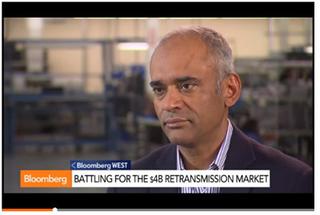If Aereo Loses Supreme Court Battle, It May Be Out of Options
Speaking with Bloomberg TV this week, Aereo CEO Chet Kanojia appeared casual in his demeanor and unsure of the outcome of the impending Supreme Court battle with the broadcast industry that is set to start on April 22.
In fact, he said there is no "plan B" if Aereo loses. He basically said that the company either wins its copyright battle with broadcasters or it disappears from the video landscape.
"There is no [other] plan," Kanojia said when asked about an alternate plan during the interview. "If we don't succeed, despite our best efforts and the good law being on our side, it would be a tragedy. But it is what it is."

Speaking with Bloomberg TV, Aereo CEO Chet Kanojia appeared casual in his demeanor and unsure of the outcome of the impending Supreme Court battle with the broadcast industry. While Aereo is facing a tough fight, if it wins, it could alter the entire broadcasting model of charging for retransmission of broadcast signals. Earlier this month the Justice Department threw its support behind broadcast networks and noted the reversal of a lower court's decision in favor of Aereo, saying that the decision "need not call into question the legitimacy of innovative technologies that allow consumers to use the Internet to store, hear and view their own lawfully acquired copies of copyrighted works."
The Justice Department apparently sided with broadcasters in claiming that Aereo gives consumers access to copyrighted content and doesn't pay licensing fees for that content.
"We believe in our merit," Kanojia said. "And not just our merit, but we do think it's the right thing. Progress is important. The mission of this company is to try to create an open platform. To try to wedge this [traditional broadcast] system open a little bit."
Just this week, on March 26, Aereo, filed a response brief with the U.S. Supreme Court, in which Kanojia states:
"Last December we decided to not oppose the broadcasters' petition for certiorari before the United States Supreme Court. We filed our response brief setting forth the basis for our steadfast conviction that Aereo's cloud-based antenna and DVR technology falls squarely within the law. We have every confidence that the Court will validate and preserve a consumer's right to access local over-the-air television using an individual antenna, make a personal recording with a DVR, and watch that recording on a device of their choice."
Even some of the various professional sports leagues, specifically the National Football League and Major League Baseball, have come out on the side of broadcasters. In what's called an amicus curiae (friend of the court brief), the sports groups said that last year's Second Circuit Court of Appeals victory for Aereo "unsettles the marketplace for licensing rights to broadcast television programming" and added that it "unravels" the foundation of television's current business model by "giving broadcast retransmission rights to unlicensed commercial strangers."
"If the broadcasters succeed," Kanojia continued in his recent filing, "the consequences to American consumers and the cloud industry are chilling."
"The longstanding landmark Second Circuit decision in Cablevision has served as a crucial underpinning to the cloud computing and cloud storage industry. The broadcasters have made clear they are using Aereo as a proxy to attack Cablevision itself. A decision against Aereo would upend and cripple the entire cloud industry.
"Since the beginning of television, consumers have had a fundamental right to watch over-the-air broadcast television using an individual antenna, and they have had the right to record copies for their personal use since the U.S. Supreme Court Sony Betamax decision in 1984. These are rights that should be protected and preserved as they have been for generations.
"We look forward to presenting our case to the Supreme Court on April 22 and we have every hope and confidence that the Court will continue validate and preserve a consumer's right to use lawful technology innovations like Aereo."
Aereo subscribers pay $8 a month to get access to local broadcast programs received via an over-the-air antenna and streamed to a device of their choosing, such as a smartphone, tablet, computer, AppleTV or Roku. They may also record and play back programming via a "remote DVR" at the Aero data center with a capacity of 20 hours of programming. Users may increase the amount of recording time available to them (to 60 hours) and get a second tuner for $12 a month. Interestingly, Kanojia said in his Bloomberg TV interview that about 25 percent of his total subscribers choose the $12 package.
Responding to the threat made by cable providers to launch Aereo-like services themselves to protect their programs, Kanojia said, "It's a free country. This is a very complicated technology. I'm not suggesting that we're the only ones who can do it, but we've solved problems that are not so straightforward."
Get the TV Tech Newsletter
The professional video industry's #1 source for news, trends and product and tech information. Sign up below.
